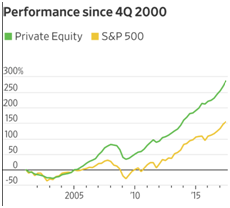Rick Ness, Managing Partner Tactico
Jul 26, 2019 - 4 Min read

Rick Ness, Managing Partner Tactico
Jul 26, 2019 - 4 Min read
In this blog, my partners and associates at Tactico will share our opinions and observations on recent trends in alternative investments, in particular venture capital. We hope to show that alternative investments can take money to make money and why access to private investments facilitates the rich getting richer (faster than others). We hope to be insightful and, if entertaining, I certainly hope not unintentionally comical.
In the first of what we hope will be several installments, we discuss the growing private investment industry and what this asset class should mean to investors.
The world of private investments is changing quickly. When measured on fundraising, annual private equity, or PE, fundraising has grown steadily every year since the financial crisis in 2008.(1) When measured on performance, venture capital, hereby referred to as VC, has outperformed all other major sectors for the past 20 years.(2)
Index 20-year average return
(3)
Cambridge Ass. US VC index 21.36%
Dow Jones Industrial Average 7.27%
Dow Jones small cap 8.79%
Nasdaq composite 5.69%
Russell 2000 Index 7.4%
It is likely that the latter observation explains the former. For example, pension funds worldwide face an ever-growing underfunding situation as their annuitants live longer and longer lives while fixed income returns trend towards zero. The superior returns generated by private investment vehicles serve to attract more and more capital. One could ask whether this flood of capital will eventually diminish the gap in returns? We believe so, but it will likely be several years before this happens.
Furthermore, because investors in the VC and PE space are less numerous while typically being somewhat more sophisticated, investors in private investment deals have more individual pricing power when compared to public market deals. We believe that private investment are more often capable of finding better valuations and pricing.
These trends are well summed up by AIC President and CEO Drew Maloney: “Pension funds across America choose to invest in private equity because private equity investments historically outperform the public markets and deliver substantial benefits to public servants and retirees.”(4)
This said, how do these trends accelerate the effect of the rich getting richer?
Given the superior returns, everyone should invest in all manner of private vehicles although they are generally only available to the wealthy. In North America, prospectus exempt or private investments securities can only be distributed to qualifying investors, such as accredited investors. Investors are defined as “accredited” upon satisfying predefined asset and-or income thresholds and demonstrate that they have sufficient capacity to tolerate the risks generally tied to private investments, such as the risk of loss or lack of liquidity (or secondary market). In other words, to be accredited or qualify for private investments, you typically need to be a very high-net-worth individual!
Access to private investments is further reduced when risk considerations, such as duration and concentration, are considered. Most people with a net worth of over $1 million are considered wealthy, and can qualify as accredited investors. However, the rule of thumb when considering the amount to invest in illiquid and private investments is generally around 10 per cent of the overall portfolio for high-net-worth individuals. This general rule means that for many “rich” investors, there are few good opportunities in the VC market where deal minimums are often $250 thousand or more, and the investment time horizon is anticipated to be 7 to 10 years. Ideally, the private investment allocation in each portfolio should be diversified across ten investments or more. Proper diversification makes investing in private investment securities difficult for most investors when high minimum requirements are required by typical VC funds.
How can the non-wealthy access the returns from private investment vehicles? There are several solutions and demand for higher returns is creating more.
The traditional method to earn higher returns is to own your own business. We believe that private business ownership creates more wealth than any other vehicle or asset class. The vast majority of this wealth creation, however, is not considered in the statistics in this blog and we will only look at private companies that have accessed third party funding. Not exactly useful advice for investors that don’t intend on leaving their current job, but it does highlight the validity of private company investing.
Investors have typically resorted to specialized investment funds in order to mitigate issues of concentration and high investment minimums. Fees have however been historically high for PE and VC investment, but these have trended downward in recent years.
There are other negative aspects of private investments funds. For instance, funds often raise money well in advance of investing and this can require investors to keep money dormant for long periods of time until called by the fund. It can be argued that this technique inflates a fund’s Internal Rate of Return, or IRR, as the periods of “near zero return” rests with the investor and not the fund. This justifies carefully looking at stated track records which can be artificially skewed.
A further concern for investors is not knowing exactly what they will own until well after making a financial commitment to invest. These concerns are usually inconsequential when earning far superior returns. For this reason, new funds and expanding funds represent a significant portion of the growth in private investing in the last ten years. If you can access high quality funds you should consider them as part of your portfolio.
Recently, special purpose vehicles, also known as SPVs, have become a growing trend in venture investing and PE. For institutional investors, investing in one specific opportunity at a time held by means of an SPV solves the problems of money sitting dormant and not knowing exactly what it will be invested in. For individuals, there are venture capital firms such as Tactico Inc. that use SPVs and allow for minimum investments as low as ten thousand dollars. Similar to private fund investing, high-net-worth investors should keep an eye out for SPV opportunities that fit their risk tolerance. When the risks tied to concentration and liquidity can be properly addressed, investing via SPVs can be an excellent strategy to join the “rich getting richer.”
We thank you for visiting our site, and we hope you found this interesting. We encourage you to signup to our investor platform to learn about the investment opportunities we offer. We will be regularly blogging about investing in private companies. As we identify venture opportunities, we will make them available to our platform participants on a first come first serve basis.
(1) McKinsey, How Private equity fared in 2017, February 2018
(2) Cambridge Associates, Private Investment Benchmarks Q4 2018 Final report
(3) Paul J. Davies Does Private Equity Really Beat the Stock Market WSJ
(4) Drew Maloney CEO AIG in an email to Bloomberg news May 5 2019